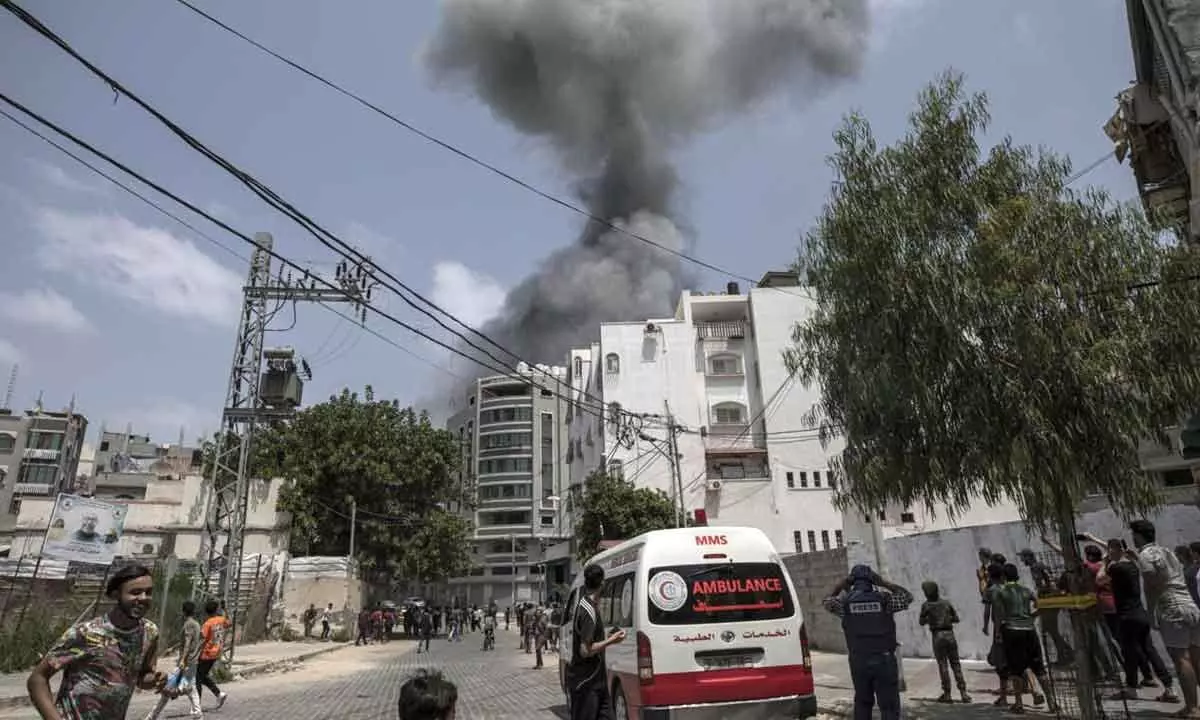Hamas brutal attack opens new security worries & puts region on alert
Hamas literally unleashed PUBG/Fortnite, the virtual games, style madness on Israeli streets, brutally killing innocent civilians, including children, humiliating women, even dead ones, and parading naked dead bodies with no remorse
image for illustrative purpose

India must enhance its surveillance capabilities by deploying specialised surveillance equipment. Still, its Quick Reaction Teams (QRTs) need to be upgraded and modernised to respond effectively in case a situation similar to Israeli attacks arises
The unprecedented terrorist attack carried out by Hamas, the terrorist arm of Palestine, across Israeli areas neighbouring the Gaza Strip is straight out of many of the violent games kids play in the virtual world. The terrorists used "all three modes", air, land and water, to launch a surprise attack on Israelis enjoying their public holiday season.
The heinous aggression has stunned the world and surely will give the intelligence community and military strategists in democratic nations, such as India, which has an ongoing conflict with hostile neighbours, sleepless nights. The attack has demonstrated that the availability and use of low-cost technology has made defending the nation's border formidable.
Who would have thought that Hamas could source motorised hang gliders, practise, fly into Israel, and drop terrorists? Military history is littered with brilliant tactical and unexpected manoeuvres carried out by conflicting groups that first stunned and then led to the change of course of military history. Similarly, in recent times, different terrorist groups who carried out similar unparalleled attacks globally, be it the 9/11 attack on the Twin Towers in the US, the 26/11 attack on Mumbai or now the 10/7 in Israel, were successfully in blindfolding intelligence communities and catching military tacticians off guard with their uncanny moves.
Last evening, during a phone conversation, a cryptocurrency enthusiast( who doesn't want to be named) suggested that I delve into a potential Chinese connection to the ongoing attack on Israel.
When I sought clarification, he revealed that over half a billion dollars in cryptocurrency had recently been lost when a Chinese Cryptocurrency platform was hacked - where do you think all the money could have landed? He emphasised. While it's important to note that there is currently no concrete evidence to support this hypothesis beyond indulging in some speculation, it raises serious concerns about cryptocurrency's possible role in financing terrorist organisations.
India has rightly taken a prudent approach toward cryptocurrencies, understanding the inherent and unknown risks associated with this technology. It has implemented stringent measures to establish checks and balances because, given the technical construct of blockchain technology, it not only enables the swift transfer of vast sums of money with a simple click the money trail can be masked too. Thus making it an appealing avenue for various actors, including suppliers of military equipment to terrorists, nation-states that sponsor terrorism, and terrorists themselves, to exploit its potential anonymity and flexibility.
The possibility that terrorist organisations such as Hamas, LeT, al-Qaeda, Taliban and ISIS can seamlessly gather funds through cryptocurrency, use them to procure military hardware and then employ covert military tactics to launch attacks against democratic nations, as seen in events from 9/11 to 10/7; demonstrates that they have developed a formula for carrying out lengthy global jihad.
As the world grapples with inhumane and colossal attacks on Israel, there are lessons for Bharat (India) in this tragedy.
New Worries for India
Our current counter-terrorism operations need a pragmatic overhaul to effectively counter terrorists' capabilities, their access to low-cost, simple yet effective technology and the intent of hostile neighbours such as Pakistan, which is willing to go any length to employ terrorism as the strategic state policy.
In recent years, Rawalpindi has pushed the use of drones to smuggle fake currency, drugs and weapons in support of terrorists and anti-India forces operating within India. The use of motorised hang-gliders and jet pack suits cannot be ruled out in future by rogue nations seeking to destabilise India by facilitating terrorist infiltration.
Therefore, India must enhance its surveillance capabilities by deploying specialised surveillance equipment. Still, its Quick Reaction Teams (QRTs) need to be upgraded and modernised to respond effectively in case a situation similar to Israeli attacks arises.
The Middle East Must Braces for Diplomatic Volatility
The attacks on Israel have the potential to further fracture relationships among Middle Eastern nations. This, in turn, could significantly impact the emerging global order, where Middle Eastern countries, including Israel, were working together to establish a commercial route known as the "India-Middle East-Europe Economic Corridor."
In a tectonic shift in the Middle East, it appeared that Israel and Saudi Arabia, who had never established diplomatic relations, were moving toward normalisation with active support from the US and a common ally, India. However, these efforts are now under scrutiny due to the sudden change in the geopolitical situation resulting from the attack on Israel by the Palestinian terrorist group Hamas. After Ghazi Hamad, Hamas spokesperson, disclosed that Iran offered support to the Palestinian terror organisation for its surprise multi-front attack on Israel, the region might become more volatile."
While it is too early to say if the terrorist attacks will derail the 'India-Middle East-Europe corridor, considering the trade and commerce benefit it brings to the region and, more importantly, the alternative it offers to the Chinese Road & Belt initiative, thereby ensuring diplomatic and strategic freedom, good sense should prevail among participating nations to safeguard the corridor. However, If the endeavour of the India-Middle East-Europe Economic Corridor fails, China stands to benefit the most.
As Israel launches a 'full-force' counter-offensive with the intent to incapacitate the 'military and governmental capabilities of Hamas,' nations like India, the UAE, and Saudi Arabia will have to wait and observe the potential fallout on the region due to inhumane attack by Hamas.
(The author is Founder of My Startup TV)

